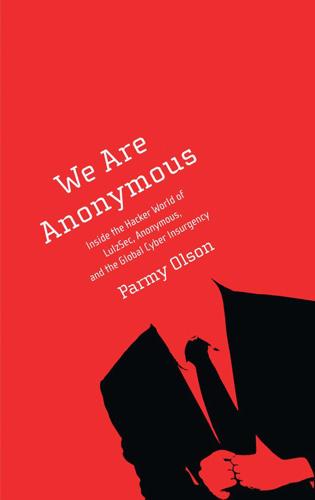
We Are Anonymous: Inside the Hacker World of LulzSec, Anonymous, and the Global Cyber Insurgency
by
Parmy Olson
Published 5 Jun 2012
Naturally, anonymity made it easier to do the odd illegal thing, break into servers, steal a company’s customer data, or take a website offline and then deface it. Stuff that could saddle you with a ten-year prison term. But the Anons didn’t seem to care. There was strength and protection in numbers after all, and they posted their ominous tagline on blogs, hacked websites, or wherever they could: We are Anonymous We are Legion We do not forgive We do not forget Expect us. Their digital flyers and messages featured a logo of a headless, suited man surrounded by U.N.-style peace branches, supposedly based on the surrealist painting of a man with a bowler hat and apple by René Magritte. Often it included the leering mask of Guy Fawkes, the London revolutionary embellished in the movie V for Vendetta and now the symbol of a faceless rebel horde.
…
On January 26, someone calling himself “Anon Ymous” sent an e-mail to Gawker’s “tips” address, about a forthcoming protest outside the Church of Scientology in Harlem. “Wear a mask of your choosing,” it said. “Bring a boombox. Rickroll them into submission. We will make headlinez LOL.” There was also a tagline at the bottom, which was appearing on YouTube, blogs, and forum posts: We are Anonymous We are Legion We do not forgive We do not forget Expect us. This now infamous closing signature, reminiscent of Star Trek bad guys the Borg, comes from the 47 Rules of the Internet. After rules 1 and 2, which were to never talk about /b/, came: Rule 3. We are Anonymous. Rule 4. Anonymous is legion.
…
Topiary wrote it up and passed the statement to Tflow, who sent it to Sabu, who used it to replace the official site of Tunisian prime minister Ghannouchi. “Greetings from Anonymous,” the home page of pm.gov.tn now read. “We have been watching your treatment of your own citizens, and we are both greatly saddened and enraged by your behavior.” It carried on dramatically before ending with the tagline: “We are Anonymous, We are legion…Expect us.” Sabu stared at the new page and then sat back and smiled. “You don’t know the feeling of using this guy’s Internet to hack the president’s website,” he later remembered. “It was fucking amazing.” The Tunisian government had set up a firewall to stop foreign hackers from attacking its servers; it had never expected attackers to come from within its own borders.
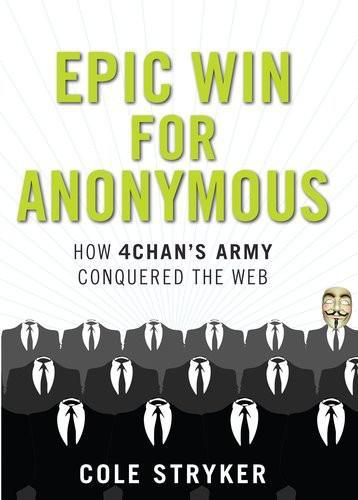
Epic Win for Anonymous: How 4chan's Army Conquered the Web
by
Cole Stryker
Published 14 Jun 2011
You have nowhere to hide because we are everywhere. We cannot die; we are forever. We’re getting bigger every day—and solely by the force of our ideas, malicious and hostile as they often are. If you want another name for your opponent, then call us Legion, for we are many. Knowledge is free. We are Anonymous. We are Legion. We do not forgive. We do not forget. Expect us. Thus began Project Chanology, kick-started by anonymous users of 4chan and other chan-style boards where anti-Scientology discussions were held following the release of the Tom Cruise video. I got in touch with “c0s,” an Anon who claims to be the guy who created and uploaded the “Message to Scientology” video, in AnonOps, an anonymous IRC channel devoted to Anonymous’s operations.
…
This information is everywhere. It is your duty to expose it. It is easy to find. Google is your friend. This is not Religious Persecution, but the suppression of a powerful, criminal, fascist regime. It is left to Anonymous. The Church has been declared fair game. It will be dismantled and destroyed. We are Anonymous. We are Legion. We do not Forgive. We do not Forget. This is only the beginning. Expect us. Anonymous continued harassing the Church of Scientology websites through the spring. They also engaged in Google Bombing techniques. A Google Bomb occurs when Google search results are successfully manipulated by spamming the search engine with specific keywords.
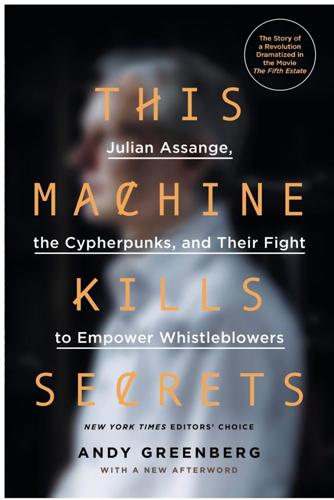
This Machine Kills Secrets: Julian Assange, the Cypherpunks, and Their Fight to Empower Whistleblowers
by
Andy Greenberg
Published 12 Sep 2012
Anonymous has therefore decided that your organization should be destroyed. For the good of your followers, for the good of mankind—for the laughs—we shall expel you from the Internet and systematically dismantle the Church of Scientology in its present form. . . . Knowledge is free. We are Anonymous. We are Legion. We do not forgive. We do not forget. Expect us. The video received 4.5 million views on YouTube, and was followed by close to two hundred cyberattacks on Scientology websites around the world, in-person protests at Scientology buildings attended by thousands wearing Guy Fawkes masks, and even envelopes of white powder—it turned out to be harmless wheat germ and cornstarch—mailed to dozens of the church’s addresses.
…
The personal details of Anonymous “members” you think you’ve acquired are, quite simply, nonsense. . . . You have blindly charged into the Anonymous hive, a hive from which you’ve tried to steal honey. Did you think the bees would not defend it? Well here we are. You’ve angered the hive, and now you are being stung. . . . We are Anonymous. We are legion. We do not forgive. We do not forget. Expect us—always. Just who pulled off the epic hack remains unclear. But one hacker named Sabu would later claim in a conversation on Anonymous’ elite IRC channel #HQ that he had “rooted their boxes, cracked their hashes, owned their e-mails, and social engineered their admins in hours.”
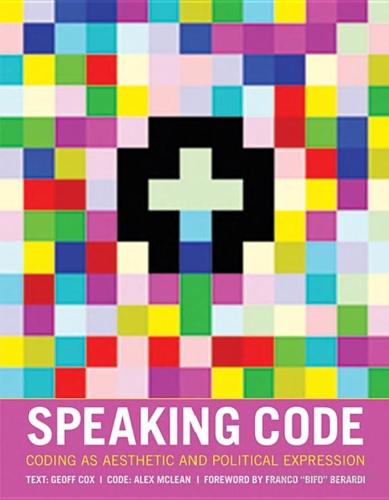
Speaking Code: Coding as Aesthetic and Political Expression
by
Geoff Cox
and
Alex McLean
Published 9 Nov 2012
It is interesting to note that at the time of writing now (summer and autumn of 2011), the enduring power of social movements and public action has been proved again, as witnessed by the various “pro-democracy” campaigns in North Africa and the Near East (so-called “Arab Spring”), movements opposing state budget cuts to the public sector, protests against the marketization of education, and the political agenda around Internet freedom and the controversies surrounding WikiLeaks.5 An example of the latter is the recent “denial of service” attacks by the loosely organized group of “hacktivists” called Anonymous.6 Emerging from the online message forum 4chan,7 the group coordinated various distributed denial of service (DDoS) attacks using forums and social media websites, where instructions were disseminated on how to download attack software to bombard websites with data to try to throw them offline, and target sites were publicized such as the organizations that had cut ties with WikiLeaks (such as MasterCard, Visa, and PayPal, through “operation payback”). Their slogan reflects their constitution as a public: “We are Anonymous. We are Legion.”8 Most recently (since 17 September 2011), the Occupy Wall 70 Chapter 3 Street movement, with its rapid spread to other parts of the world, also seems apposite in its reappropriation of common space in places where financial power is centered (squatting its symbolic sites, to express indignation about the handling of the financial crisis since 2008).9 Adopting the “#Occupy” hashtag,10 the wider Occupy movement is described in terms that embody publicness in a wayward culture of financial calculation and social inequality: “We are the 99%.”11 Perhaps it can be claimed that the concept of publicness has itself been occupied in these recent events.
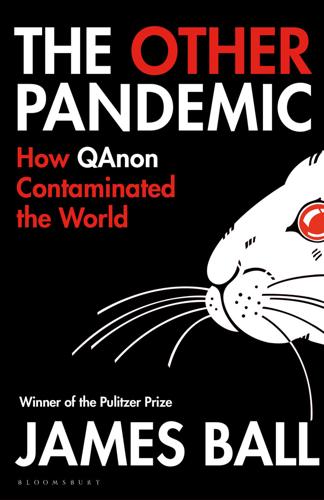
Other Pandemic: How QAnon Contaminated the World
by
James Ball
Published 19 Jul 2023
‘We recognize you as serious opponents, and do not expect our campaign to be completed in a short time frame. However, you will not prevail forever against the angry masses of the body politic,’ the narrator warned, shortly before ending in the group’s well-known sign off. ‘You have nowhere to hide because we are everywhere … We are Anonymous. We are Legion. We do not forgive. We do not forget. Expect us.’ The video became known as ‘the video that made Anonymous’.27 It had more than 2 million views within a week of publication, and at the time of writing has had more than 5.4 million.28 But it was what the actions and the video sparked in the real world that really changed things.
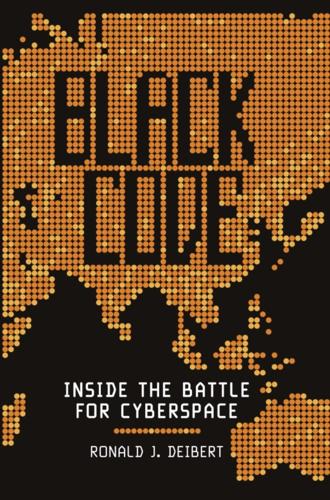
Black Code: Inside the Battle for Cyberspace
by
Ronald J. Deibert
Published 13 May 2013
You can take down our networks, arrest every single one of us that you can backtrace, read every bit of data ever shared from computer to computer for the rest of this age, and you will still lose. So come at me, bro. You can retaliate against us in any manner you choose. Lock down the Web. Throw us in prison. Take it all away from us. Anonymous will live on. We are Anonymous. We are legion. We do not forgive. We do not forget. Expect us. Less than a year later, in an Anonymous signature moment, the movement posts an intercepted recording of a conference call between the FBI and Scotland Yard. The topic of the conference call? Anonymous itself. The call starts out with a few casual exchanges – jokes and observations about the weather – before moving on to the topic of rounding up people suspected of links to Anonymous, little doubt those behind the intercepted recording itself.
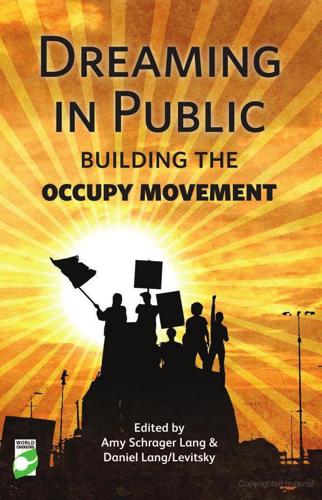
Dreaming in Public: Building the Occupy Movement
by
Amy Lang
and
Daniel Lang/levitsky
Published 11 Jun 2012
This is a paradigm the lumbering hierarchies of the last century struggle to keep pace with – in the same way that the US army has struggled with guerrilla warfare (or ‘insurgencies’) ever since Vietnam. For me, the masks of Anonymous say more about the culture that neoliberalism creates than they do about the people who wear them. The mask means more than just anonymity, it is strength in numbers. In one of their calling-card phrases, Anonymous say: ‘We are Anonymous, We are legion.’ It answers a human need to sometimes be one of many, not just a ‘self’. In anonymity, people can hope to escape the exhausting egoism of our age, the atomizing force of late capitalism where the pressure is all on the self and particularly the self-image. Retreating into the crowd can feel like a relief.
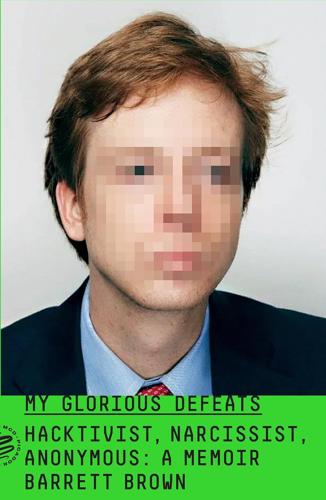
My Glorious Defeats: Hacktivist, Narcissist, Anonymous: A Memoir
by
Barrett Brown
Published 8 Jul 2024
We recognize you as serious opponents, and do not expect our campaign to be completed in a short time frame. However, you will not prevail forever against the angry masses of the body politic. Your choice of methods, your hypocrisy, the general artlessness of your organization have sounded its death knell … Knowledge is free. We are Anonymous. We are legion. We do not forgive. We do not forget. Expect us. Within twenty-four hours of being posted, the video had received a hundred thousand views and become the subject of widespread speculation; Gawker and other outlets ran it prominently on their sites. Some doubted that anything would come of it.
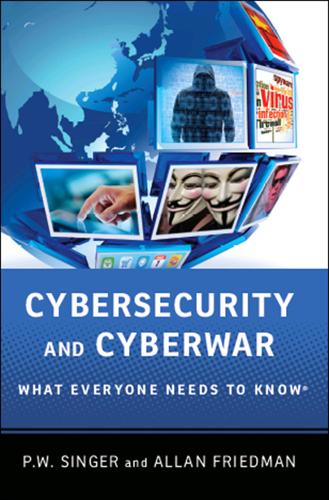
Cybersecurity: What Everyone Needs to Know
by
P. W. Singer
and
Allan Friedman
Published 3 Jan 2014
HB Gary’s reputation as a security firm was destroyed in what Wired magazine described as an electronic version of a “beatdown.” By the end of the month, a congressional committee was investigating inappropriate contracts by the firm, and Barr had resigned in disgrace. As Anonymous concluded its message on HB Gary’s website, “It would seem the security experts are not expertly secured. We are Anonymous. We are Legion. We do not forgive. We do not forget. Expect us.” With exploits like this and its signature use of Guy Fawkes masks (in honor of the 1605 Gunpowder Plot, popularized as an antigovernment symbol in the movie V for Vendetta), Anonymous may be the most noted of the hactivist groups. Ironically, its notoriety is due to its anonymity.
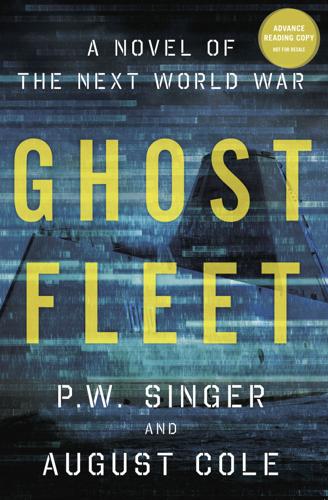
Ghost Fleet: A Novel of the Next World War
by
P. W. Singer
and
August Cole
Published 28 Jun 2015
Before he could decide, the auditorium’s projector lit up the center of the room. A massive white blaze of light crystalized into a holograph, the pinpricks of light forming a smiling black-and-white mask. A digitized voice boomed across the room’s speakers and into each of the linked helmets: “We are Anonymous. We are Legion. We do not forgive. We do not forget . . . And we are back!” Then the room went dark. Directorate Command, Honolulu, Hawaii Special Administrative Zone So the Russian had really done it. General Yu’s aide-de-camp had seen them on the security camera, and her identity had been confirmed, but he hadn’t been truly sure until he saw them up close.
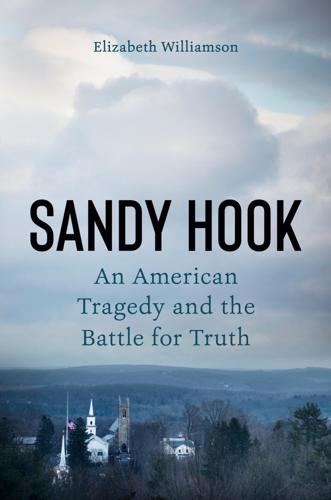
Sandy Hook: An American Tragedy and the Battle for Truth
by
Elizabeth Williamson
Published 8 Mar 2022
“Doug I will have an awesome attorney, private investigator and apartment for you in the next couple weeks. Your ex wife’s family apparently does not comprehend the consequences of what they did to you, and they are going to learn what I do to people who hurt children and make false allegations,” she wrote to him on Facebook. She signed off with a string of Russian-language boasts like “We are anonymous! We are legion! Expect us!” In fact Molly lived with her toddler in her parents’ basement in New York. The child’s father was serving a long prison sentence. Molly, still in her twenties, was in and out of recovery. Molly offered to help Maguire clean up his Facebook account as part of his effort to regain custody of Vincente, by then four years old.

Active Measures: The Secret History of Disinformation and Political Warfare
by
Thomas Rid
The folder contained a confusing assortment of letters and documents seemingly sent from German, British, American, and Czech officials to their Ukrainian counterparts. The first document listed in the leak included the diplomatic passport of a U.S. State Department official. The authors signed off with the usual Anonymous formula, “We are Anonymous, We are Legion, We do not forgive, We do not forget,” adding “Greetz to our Fellaz in Ukraine, Greetz to all Anons and Lulz.” Five days later, another post from “Anonymous Ukraine” appeared on CyberGuerrilla. This one declared the start of #OpIndependence. The authors emphasized Ukraine’s independence from the European Union and Russia, and displayed an especially sharp anti-NATO slant.
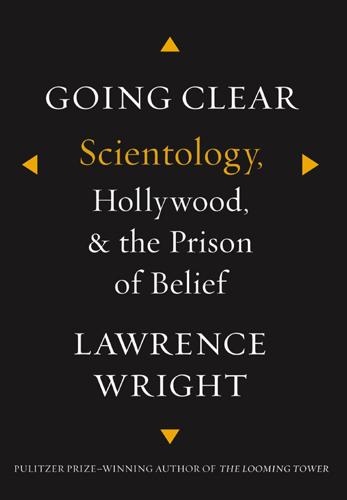
Going Clear: Scientology, Hollywood, and the Prison of Belief
by
Lawrence Wright
Published 17 Jan 2013
Until then, they had never protested anything, but they considered the Internet their turf and were offended that the church would attempt to control what they watched. In truth, they knew little about Scientology, but the more they learned, the more aroused they became. “We shall proceed to expel you from the Internet and systematically dismantle the Church of Scientology in its present form,” Anonymous declared in a creepy video of its own. “We are anonymous. We are legion. We do not forgive. We do not forget. Expect us.” Some members of the Anonymous coalition waged denial-of-service attacks on church computers, shutting down their websites for an extended period. On February 10, 2008, Anonymous organized protests in front of Scientology churches and missions in a hundred cities across the world.
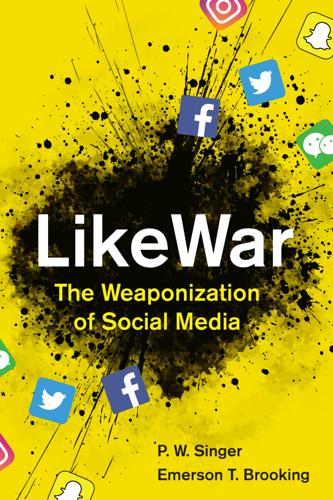
Likewar: The Weaponization of Social Media
by
Peter Warren Singer
and
Emerson T. Brooking
Published 15 Mar 2018
“We are held by a code of honor to protect those who are defenseless, both in the cyber world and the real world.” The figure folds its hands, black suit contrasting with the sepia-tinted globe behind it. The video ends with a motto intended to send chills down the spine of any internet user. We are Anonymous. We are Legion. We do not forgive. We do not forget. And finally, as the screen fades to black: Expect us. When ISIS rocketed to digital prominence, it drew the attention of the world, but also an unexpected adversary: members of the hacktivist group Anonymous. The Islamic State’s viral propaganda struck a nerve.
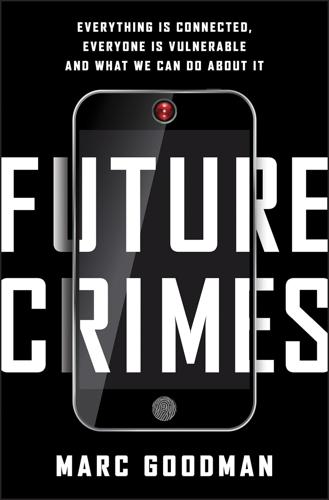
Future Crimes: Everything Is Connected, Everyone Is Vulnerable and What We Can Do About It
by
Marc Goodman
Published 24 Feb 2015
While Assange, Manning, and Snowden have been propelled onto the covers of newspapers around the world, other hacktivist groups prefer that their individual members remain discreetly hidden in subordination to the organization itself and its broader agenda. One such notable example is Anonymous, a self-described leaderless organization whose members have become recognizable in public for wearing Guy Fawkes masks. The group’s motto, “We are Anonymous. We are legion. We do not forgive. We do not forget. Expect us,” manifests its organizational ethos: “The corrupt fear us. The honest support us. The heroic join us.” When MasterCard, Visa, and PayPal all agreed to stop funneling donations to Julian Assange’s WikiLeaks organization, Anonymous responded by launching a series of effective cyber attacks against the financial firms.

Free Speech: Ten Principles for a Connected World
by
Timothy Garton Ash
Published 23 May 2016
On the one hand, it is the hallmark of the torturer, the paedophile and your bog-standard online scatologist. On the other, it is a mark of protest against established powers. An influential group of hacker activists, or ‘hacktivists’, uses the Twitter account @AnonymousWiki. Their motto is: We are Anonymous We are Legion We do not forgive We do not forget Expect us. Parmy Olson, in her book We Are Anonymous, points out that ‘we are Legion’ derives from a passage in the King James translation of the Bible where Jesus approaches a man possessed by demons and asks his name, to which the man replies: ‘My name is Legion: for we are many’.143 Anonymous, in this incarnation, hacks into the accounts and websites of companies and organisations (including even the FBI), makes public their internal communications and posts messages of protest.